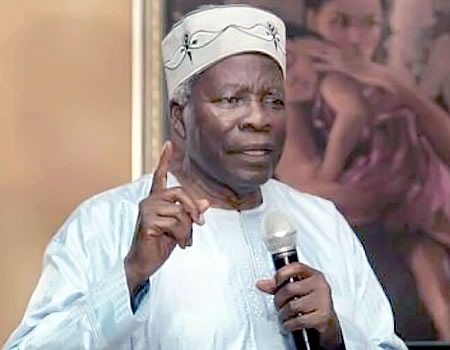A paper delivered by Professor Banji Akintoye as Guest Speaker at a summit on “Peace Building and Conflict Prevention in Lagos”, hosted by ‘Journalist for Democratic Rights’ in Lagos on July 30, 2019.
Another root of the freedom of Lagos and the rest of Yoruba land from the wars that have been raging in Nigeria is the Yoruba culture of hospitality to strangers and foreigners. The foundations of Yoruba spiritual life demand that the foreigner must be accepted in love and be helped and included. Even in today’s experiences of warped inter-ethnic relations in Nigeria, when some of the non-Yoruba who relocate to the Yoruba homeland tend to treat their hosts with disrespect or even hostility, the Yoruba continue to hold very firmly to their ancient and spiritual injunctions concerning strangers and foreigners. This cultural trait, together with Yoruba land’s economic strength and culture of religious harmony, has been the factors making the Yoruba South-West the destination for most Nigerians relocating from their home regions.
For Nigeria to progress towards becoming a land of peace, security and harmony, one of the deliberate policies of Nigeria’s policy makers ought to have been to contribute consciously to the preservation, or even the enhancement, of the peaceful character of this Yoruba haven of South-Western Nigeria – with the objective and the hope that the peace and security that exist here would expand to the rest of Nigeria. But that is not what has been happening. Instead, what has been happening is that very intense efforts have usually been made to bring into the Yoruba South-West the culture of religious and ethnic wars that have been wracking most parts of Northern Nigeria. It is well known to most citizens of Yoruba land and Nigeria that surreptitious but determined efforts are always being made to influence and distort the religious character of the Yoruba South-West and to influence some Yoruba citizens to rev up Islamic extremism in their homeland.
PDP will do everything to win Lagos ― Secondus
Fortunately, the integrity of the Yoruba culture of religious tolerance and harmony has been so strong that it has, on the whole, succeeded to resist the religious subversion being injected from other parts of Nigeria. The decisive factor here has been the Yoruba Muslim population and their enormous success and sophistication in Yoruba society. Yoruba Muslims are not only generally as educated as the rest of their Yoruba nation, they also rank among the foremost promoters of education among their Yoruba people. They rank among the foremost builders of schools, colleges and universities in Lagos City, Lagos State and in all states of Yoruba land. Yoruba Muslims are always a very respectable part of the elite of the Yoruba nation – as professionals, academics, scientists, top civil servants, entrepreneurs, business captains, entertainers, artists, political leaders, elected public officials, etc.
Among citizens who are so well established among their people, the urge to any kind of fanaticism or extremism, religious or non-religious, is virtually impossible to promote. The one or two members of the elite who have sometimes chosen to incline towards purveying religious fanaticism or extremism have usually had little or no chance to win many adherents. When Boko Haram attempted to expand its Islamic terrorism to Lagos and a couple of other Yoruba states in 2013 to 2014, the vigilance of the people assisted the law enforcement authorities to foil their efforts.
But Yorubaland has not been as lucky as this in resistance to inter-ethnic bloodletting. Since about 2014, Nigeria has experienced a horrific surge in virulent specie of inter-ethnic war. The particular character of this experience has been that one of Nigeria’s smaller nationalities has come forth with an ambitious agenda aimed at planting its elements by force into the homelands of virtually all other nationalities across the face of Nigeria. Most of the consequent killings, maiming, raping and destruction of farms and villages have been in the homelands of the peoples of the Middle Belt and the South, including the Yoruba South-West.
Because this generation of ethnic violence started with cattle herders destroying farms and therefore clashing with farmers, it was generally called herders-farmers conflicts initially. But over time, the true nature of the conflicts has become better known. For one thing, the cattle herders in these conflicts are not like the traditional cattle herder peacefully herding his cattle in the countryside, respecting farms on his way, armed with only a stick and doing no harm to anybody or any property. Today’s cattle herder involved in the conflicts is belligerent, comes with the obvious intention of guiding his cows to ravage farms and is accompanied by well-armed, AK 47 Rifle-carrying militiamen who are no cattle herders at all and who seem to be well trained in military combat. When farmers protest or resist the destruction of their farms, the militiamen go into action, killing farmers and farmers’ families, and destroying their villages. These rampages are not directed only at peasant farming; they are directed also at modern large-scale agricultural ventures. They are not directed only at leading cows to ravage farms of arable crops; they are also directed at cutting or burning plantations of tree crops.
Very obviously, this whole devastation is a well-planned and well- coordinated invasion aimed at seizing territory – aimed at disrupting orderly life of some areas in order to seize and occupy the land and ultimately to create Fulani enclaves. This whole plan is not just a Nigerian agenda; more and more, we are learning that Fulani people from all countries of West Africa are streaming through the Nigerian North-West into Nigeria and aggressively seizing land in the Middle Belt and the South. The seizure of territory is already considerably successful in parts of the Middle Belt. In some parts of Yorubaland, some areas – especially forested areas – have seen the arrival of large numbers of Fulani from other countries of West Africa and they are aggressively behaving as if the land belongs to them.
Any doubt that these acts are acts of invasion and conquest is easily dispelled by what some of the spokespersons for the cattle herders are publicly saying. When the Ekiti State government made a law to regulate cattle rearing in Ekiti State, some leaders of the cattle herders responded that they would flout the state’s law and that they would bring intensified violence upon the people of Ekiti. In late 2017, after the Benue State government had made a law to regulate cattle rearing in Benue State, an organisation representing the cattle herders wrote a letter to the state governor, threatening that they would bring violence upon the people of Benue State in response to the law.
On New Year Day 2018, the threatened violence came and it took the lives of over 70 people and destroyed many villages. While the people of Benue State were mourning and carrying out mass burials, yet another letter came from the same Fulani herders’ organisation. On January 5, the governor of Benue State read this letter to a large assembly consisting of leaders of his state and a delegation from the South and the Middle Belt that had come to commiserate with the people of Benue State. There were four Yoruba representatives in that delegation – including me.
The letter threatened that bigger attacks would soon be coming upon the people of Benue State. It explained that the problem was that the nationalities of Benue State regarded their ancestral homelands as theirs, whereas all the land belongs to the Fulani (“to us Fulani”). It added that what was true of the land of Benue State was also true of all the land of Nigeria. It threatened that the Fulani had amassed large arsenals of weapons and large amounts of money for this war; that they had invited all Fulani people from all over West Africa to come and help conquer all of Nigeria; that they were ready to fight for years and years to come; and that the Federal Government could not stop them. There have been some more letters like this circulating, some of them on the social media.
Frequently in such letters of threat, the language used is that “we Fulani” will “kill, maim, destroy, banish”. From time to time, even prominent Fulani citizens have made statements to the effect that the Fulani can, and will, freely seize territory anywhere in Nigeria. Relentlessly, the Federal Government has been manoeuvring to get the governments of the states to grant land for Fulani enclaves or Fulani cattle colonies now called Ruga. The obstacle to the Federal Government has been the Land Use Decree which vests the land of each state in the government of the state; but now there are indications that steps may be taken to get the Land Use Decree amended or abolished. Also, some latest reports have it that the Federal Government is stopping state governments from employing high-tech gadgets to watch over their forests.
In more recent months, kidnapping of people has become the most sensational feature of these rampages. Most kidnappings are carried out by holding up traffic on highways and seizing choice travellers from vehicles. Some highway hold-ups also seem to have the objective of assassinating targeted notable travellers. Kidnappers most often hold their victims deep in the bush and demand and extorted ransom from their families. Many kidnapped persons end up being killed in the bush. It is widely believed among Yoruba people that while the kidnapping gangs might be expending part of the ransom to sustain themselves on the run, they also apparently send much money to some central war chest.
Under the cover of this development, some local criminal youths (youths from all parts of the South) are mounting kidnapping operations of their own in various parts of the Yoruba South-West, in order to get some share of the ransom bonanza. According to some estimates, about 30,000 Nigerians have been killed by these rampages across Nigeria, some of them in the Yoruba South-West. In the Middle Belt, hundreds of thousands have been displaced to Internally Displaced People (IDP) camps.






